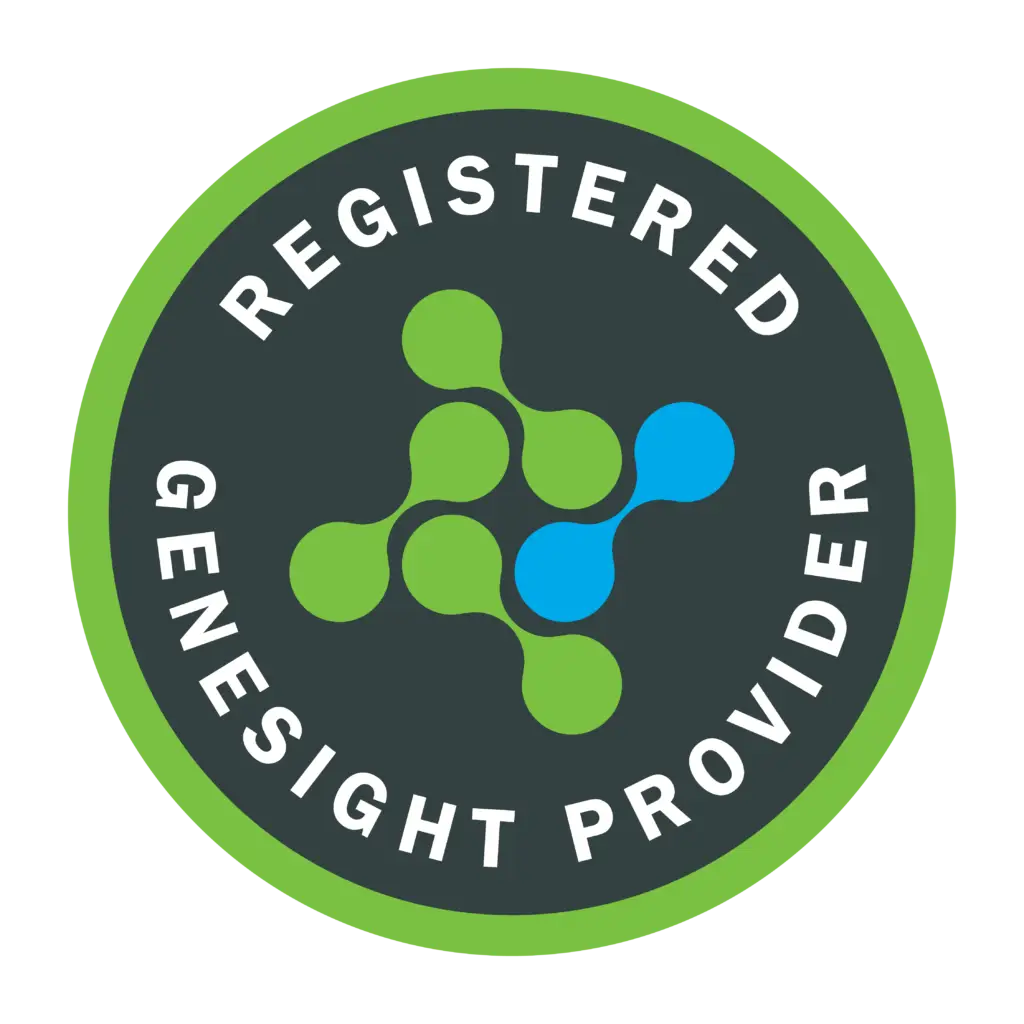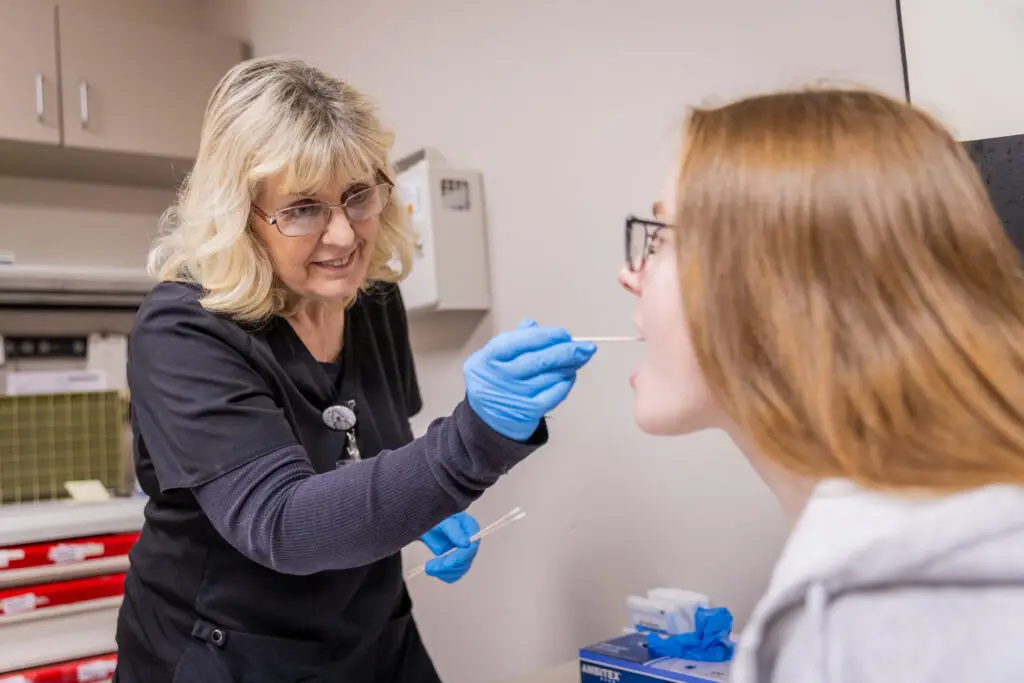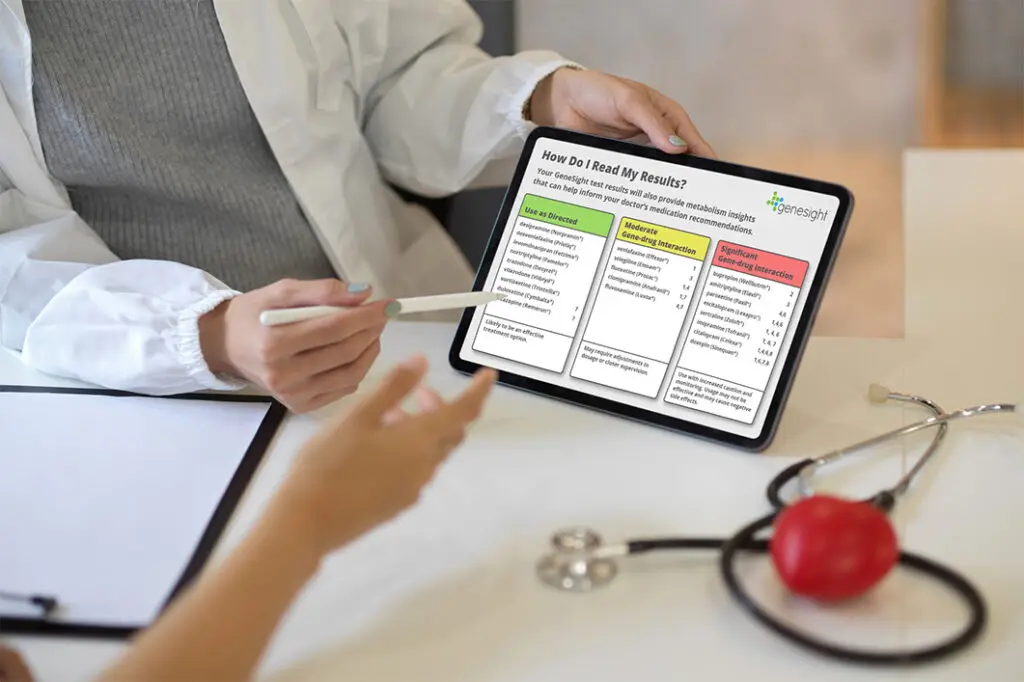Advanced Therapy
GeneSight Genetic Testing For Mental Health Medications
GeneSight testing is an innovative genetic test that helps identify how your body responds to more than 60 commonly prescribed psychiatric medications. By using your genetic profile to guide treatment, it reduces the trial-and-error process, minimizes side effects, and improves the chances of finding the right medication sooner.
One Of Very Few Certified Providers

Understanding GeneSight Testing
Imagine being on your fourth antidepressant in two years — each taking weeks to try, only to bring side effects like exhaustion, weight changes, or worse anxiety. GeneSight testing changes that process.
By evaluating the response of 15 different genes on 60 different medication options, testing helps your provider see which meds are more likely to help and which to avoid. Your prescription isn’t just another guess — it’s informed by science and tailored to you.
GeneSight testing for medications helps narrow options based on your unique genetic profile, so you avoid long waits to see if something might work.
By identifying medications your body is less likely to tolerate, GeneSight help reduce frustrating side effects that often derail progress.
When the right medication is quickly, symptoms improve faster — helping you feel stable and hopeful again.




How GeneSight Testing Works
The genetic testing swab only takes a few seconds with results back from the lab in less than a week.
Collect a DNA Sample
A simple cheek swab is used to gather a small DNA sample — quick, painless, and done in minutes.
Analyze Your Genetic Markers
Your sample is tested for specific genetic variations that affect how your body processes and responds to different psychiatric medications.
Generate a Clear Report
Results are organized into an easy-to-read report showing which medications may work well, which may require caution, and which are more likely to cause side effects.
Review Results with Your Provider
Your clinician explains what the findings mean for you and how they can guide future treatment choices.
Use Insights to Guide Treatment
With this information, you and your provider choose medications more likely to help for effective treatment faster.
Experts in Mental Health Medications
Psychiatric care here is provided by a seasoned medical team who bring decades of hands-on experience to each treatment plan. They combine deep knowledge of mental health medications with the insights from your GeneSight results, using both science and clinical judgment to get you better quickly and for the long-term.

Medical Director
- 15+ years of experience and Board Certified in both Internal Medicine and Addiction Medicine.
- Specializes in Internal, Addiction, and Hospital Medicine

Medical Director
- 30+ years of experience Practicing Medicine
- 8+ years of experience dealing with Addiction

Nurse Practioner
- 5+ years of experience, specialized in addiction
- Board-Certified in Adult-Gerontology
Most Common Conditions We Treat With GeneSight Testing
GeneSight testing is helpful whether you’ve never tried psychiatric medication to start with the most informed choice, you’ve been through multiple prescriptions in the past without finding relief, or you’re currently on medication questioning if it’s the best fit.
Depression
Tests how you metabolize over 56 antidepressants — including SSRIs like sertraline (Zoloft), SNRIs like venlafaxine (Effexor), tricyclics, and atypicals like bupropion (Wellbutrin) — so clinicians can hone in on drugs less likely to fail you or cause side effects.
Anxiety Disorders
Helps rule out medications more likely to increase jitteriness or restlessness — like certain SSRIs — and guides toward those that give steadier relief with fewer unwanted reactions.
Attention-Deficit/Hyperactivity Disorder (ADHD)
Guides choices between stimulants (e.g., methylphenidate, amphetamine salts) and non-stimulants by assessing how your body processes each—so you can narrow in on what helps focus without worsening sleep or mood.
Obsessive-Compulsive Disorder (OCD)
Highlights meds — like SSRIs and augmenting agents — that are genetically more likely to reduce compulsions while avoiding those that might heighten agitation.
Post-Traumatic Stress Disorder (PTSD)
Filters options to find medications that target hyperarousal or intrusive anxiety more precisely, without falling into sedating or destabilizing categories.
Bipolar Disorder
Flags mood stabilizers (such as lithium or lamotrigine) that align with your enzyme metabolism — helping avoid drugs that risk mood swings or serious side effects based on your genetic profile.
Beyond Just Prescriptions
Here, GeneSight testing is one of more than 25 treatment options offered in a calm, private, and judgment-free process where you can comfortably share your full history and concerns. Providers take time to explain your results in plain language, answer questions, and work with you to choose the most effective, tolerable medication or therapy options.
Professional, Medical Consultations
Confidential Testing Rooms
Collecting DNA Sample
Where To Get GeneSight Testing
Though research shows slow adoption among other treatment centers, GeneSight testing is available nationwide at The Haven Detox — whether you stay close to home or travel for care. It’s just one example of the gold-standard and innovative treatment options that contribute to our high success and trusted reputation.

The Haven Detox - Arizona
Space Available
GeneSight Offered
Insurance Accepted

The Haven Detox - West Memphis
Space Available
GeneSight Offered
Insurance Accepted

The Haven Detox - Florida
Space Available
GeneSight Offered
Insurance Accepted

The Haven Detox - New England
Space Available
GeneSight Offered
Insurance Accepted

The Haven Detox - New Jersey
Space Available
Insurance Accepted

The Haven Detox - Little Rock
Space Available
Insurance Accepted

The Haven Detox - Puerto Rico
Space Available
Insurance Accepted
GeneSight Success Stories
Real patient experiences showing the impact of personalized treatment approaches at The Haven Detox.
King S.
From the moment I walked in, I was met with a warm and welcoming atmosphere. It’s clear that you prioritize not only treatment but also compassion and understanding. The range of inpatient and outpatient services you offer is impressive, making it accessible for everyone who walks through your doors. I appreciated the personalized approach, which really makes a difference in the healing process.

John K.
I have done about 11 different treatments and this facility has brought together all the aspects I need in my recovery such as the proper medication mixed with the proper therapy. I have never been treated so humanely at a facility in my life. This place has changed me and my path in life and I am forever grateful.
Kara Q.
I was able to see a doctor/nurse daily and felt like my care was very personalized. Everyone there from the nurses to housekeeping was very friendly!
Insurance Coverage for GeneSight Testing
Most insurance plans cover GeneSight testing when it’s ordered by a qualified provider as part of a mental health treatment plan. A free, discreet insurance check can confirm your specific coverage before testing.
Still Have Questions About GeneSight Testing?
What is GeneSight testing?
GeneSight testing is a DNA-based test that analyzes how your body metabolizes medications. By using a simple cheek swab, it helps identify which medications are most likely to work effectively while minimizing side effects.
How accurate is GeneSight testing?
The lab work itself is extremely accurate. The translation to real-life results have shown a 50% higher remission rate and a 30% higher symptom improvement using GeneSight compared to usual prescribing methods.
For example, GeneSight might reveal that a patient’s body metabolizes a certain medication too quickly to get the full benefit. There is no way to know that this medication will not be effective or why this drug is not effective for that patient without the testing.
What specific genes does it test for?
GeneSight looks at 15 genes involved in how your body processes medications (pharmacokinetics) and how medications affect your brain chemistry (pharmacodynamics). This includes:
- CYP450 family (like CYP2D6, CYP2C19, CYP1A2) – enzymes that control how fast or slow you metabolize many antidepressants, antipsychotics, and ADHD meds.
- SLC6A4 – linked to serotonin transport and your likely response to SSRIs.
- HTR2A – related to serotonin receptor function, which can impact tolerability and side effect risk.
For example, if CYP2D6 shows you’re a “poor metabolizer,” drugs like paroxetine (Paxil) might build up in your system and cause side effects at even low doses.
Who is a good candidate for GeneSight testing?
GeneSight is especially useful for:
- People who have tried two or more medications without full success.
- Those who have had significant side effects that caused them to stop a medication.
- Anyone starting a psychiatric medication for the first time who wants to reduce trial-and-error.
- Patients with complex or dual diagnosis conditions like depression with co-occurring anxiety or ADHD.
Does GeneSight work for conditions like schizophrenia or eating disorders?
Yes, it can still be helpful—but indirectly. GeneSight includes several antipsychotics (used in schizophrenia, bipolar disorder, and as adjuncts for depression) and mood stabilizers, so the results can guide medication choices in those cases. For eating disorders, it doesn’t target the disorder itself, but can inform antidepressant or antipsychotic selection used as part of a broader treatment plan.
How often should the test be repeated, if ever?
GeneSight testing is generally a one-time test. Your DNA doesn’t change, so your core results stay the same for life.
What happens if the results don’t match how I respond to a medication?
GeneSight doesn’t predict results with 100% certainty. Instead, it categorizes medications into “use as directed,” “use with caution,” or “use with increased caution/consider alternatives” based on your genetic profile.
For example, you might get a report showing escitalopram (Lexapro) in the “use as directed” group, while fluoxetine (Prozac) appears in the “use with caution” group. Your provider uses this information along with your symptoms, history, and preferences to make the best choice.
If you react poorly to a “use as directed” medication, it might be due to other factors like interactions with non-psychiatric medications, underlying health conditions, or lifestyle factors. For example, caffeine can impact how certain ADHD medications work, even if your genetics say they should be effective.
Related Treatment Options
Have Questions? Let’s Talk!
Call the free 24/7 helpline to get answers and a plan for treatment that’s best for your specific medical and insurance situation — even if it’s not with us.
24/7 Support
Need someone to talk to? We’re always here—day or night.
No Commitment
Ask questions, get guidance—no pressure, no obligation.
100% Private
Your story stays with us. Confidential support, always.

